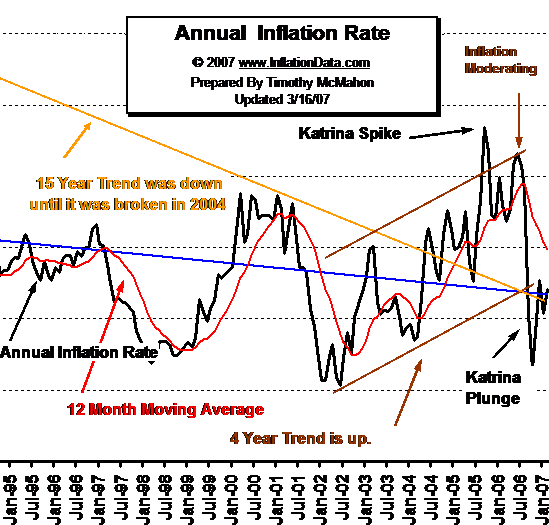

|
| weblog/wEssays archives | home | |
|
Inflation: Official Denial (April 13, 2007) In economic theory, inflation means expansion of the money supply. Fine. But in day-to-day living, supply and demand still rule. This can be illustrated by one simple example. Let's say money supply is shrinking, perhaps due to a massive credit crunch. In such a deflationary environment, prices should drop. But if petroleum and basic food stuffs are in short supply due to imbalances in supply and demand, Peak Oil, crop failures, etc. then prices will rise regardless of what happens to money supply. In other words, macroeconomic changes in money supply will undoubtedly affect asset prices (housing, stocks, bonds, gold, etc.) but the cost of non-discretionary items will be set by supply and demand. A better definition of inflation in the real world is this: when the product or service you buy hasn't changed much but the price has increased. In other words, the onion or gallon of gasoline is the same as it was 5 years ago, but it costs a lot more now. That's inflation. There is another factor which I have addressed before: the documented tendency of all government services to rise in cost regardless of deflationary or low-inflationary eras. It seems obvious that asset prices could deflate rapidly in a credit crunch even as prices of gasoline, food, trash collection, education and medical care rose ever higher due to supply and regulatory issues. The current CPI is flawed on two levels. As I have documented here before, it grossly understates the impact of healthcare, rising property taxes and insurance, and makes false adjustments based on "hedonic" calculations. Thus if the computer you bought yesterday has vastly more features than the one you bought two years ago, then the "cost" is adjusted to reflect that you got "more for your money" now. Nice, but in the real world we use cash accounting. If the car costs more than it did two years ago, then do we really care that its hedonic value adjusts the increase to zero on the official calculation of inflation? Another key problem is this: the costs of discretionary items can drop, but since we don't have to buy them, then any "price deflation" in their costs doesn't off-set the increases in items we have to buy: insurance, gasoline, heating oil, food, etc. 
For example: the cost of plain round onions has risen from 29 cents to 89 cents in just a few years. The price of flimsy particle board cabinetry from China has gone down. The two offset each other in the Consumer Price Index, which continues to show near-zero inflation. But we have to eat, buy gasoline, etc., where we don't have to buy particle board cabinets, a new car, etc. An accurate measure of inflation would compare a basket of non-discretionary items (food, gas, insurance, education, etc.) and separate out discretionary items. Let's face it: if times get tough, nobody needs new particle board cabinets or a new car or another electronic toy. The prices of those items could fall precipitously and have virtually no impact on actual family budgets. Here's a fun experiment. Pick a year where you have some old price information about your own household expenses and then calculate the actual inflation versus the official inflation. You can get the official number here: inflation calculator (by year) (under the heading "Get Detailed CPI Statistics") I chose 2004, three short years ago. According to the BLS data, the CPI has risen 8% in those three years. Funny, but all the stuff I have to buy has increased by way more than a mere 8%. Here are a few selections. Undoubtedly you have more of your own. (supposedly capped at 1% per annum by Prop 13) Anyone looking at their own checkbook will be skeptical of the "official" inflation rate of 2.5%. But the general reaction is denial. Could this be because asset inflation in houses and stocks has lulled people into a false complacency that their wealth will always increase faster than prices? Here is a website with some interesting charts and resources: inflationdata.com. For more on this subject and a wide array of other topics, please visit my weblog. copyright © 2007 Charles Hugh Smith. All rights reserved in all media. I would be honored if you linked this wEssay to your site, or printed a copy for your own use. |
||
| weblog/wEssays | home |